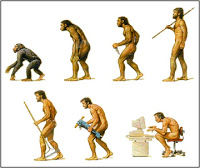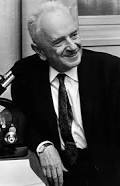All Things

- Evolution And Progress
Friedrich NietzscheIn the late nineteenth century, many biologists and thinkers, atheists or agnostics, relied on Darwin's theories to build philosophical schools that combined the newly discovered evolution with the eighteenth-century idea of ??progress,...
- Sex And Species, Two Related Concepts
Taxonomic categoriesThe species is the basic taxonomic category used by biologists to classify living things. The other categories (genus, family, order, class and phylum) are considered artificial and arbitrary. On the other hand, we tend to regard the...
- Classifying Living Beings: Cladistics Or Complexity Levels
The tree of lifeSince Aristotle, living beings have been classified in kingdoms. At first there were two: plants, practically unmoving, and animals, capable of active movement.When Antony van Leeuwenhoek discovered microorganisms, biologists tried to...
- Cultural Evolution And Biological Evolution
Cultural and biological evolution are similar because natural selection acts in both cases. Cultural productions compete against one another and many become extinct. As in the case of living beings, not always the best win. Chance has an influence. In...
- This Is What Science Says About Human Life
With respect to current discussions about abortion, protection of life, and the rights of the pregnant woman, I think it timely to recall the scientific consensus about human life: · The life of every...
All Things
Is man just an animal?
 |
| Theodosius Dobzhansky |
Modern biologists frequently say that man is not special, that we are just a species among many. Thus, for instance, Colin Tudge writes this:
Phylogenetically we are an outpost, a tiny figment of life, just as Earth is a cosmological nonentity that no other intelligent life-form in the Universe would bother to put in their celestial maps.
(The variety of life, Oxford University Press, 2000).
This is just the indiscriminate application of a pseudo-scientific dogma that few biologists would dare contradict, which can be expressed in one of the following equivalent ways:
- All species of living beings are equivalent; no one is superior to the others.
- There are no criteria that make it possible to compare the importance of different species.
- Man is not superior to chimps, ants, bacteria...
- Evolution has no direction.
At bottom, what is happening is this: materialist atheism is trying to reduce man to the level of an animal, so as to deny our possible transcendence. This is something that the most important biologists of the middle twentieth century, including atheistic biologists, would not allow.
Julian Huxley wrote:
The gap between man and animals was here reduced not by exaggerating the human qualities of animals, but by minimizing the human qualities of men. (Man stands alone, Harper & Bros., 1941).
George Gaylord Simpson wrote:
[Man] is another species of animal, but not just another animal. He is unique in peculiar and extraordinary significant ways. (This view of life, Harcourt, Brace & World, 1964).
Theodosius Dobzhansky wrote:
Culture has been achieved in only a single species in the entire living world. And yet by this achievement human evolution has transcended, that is, it has gone beyond the limits of, biological evolution. (Human culture: a moment in evolution, Columbia University Press, 1983).
The truth is, to assert that man is just an animal, as modern atheistic biologists do, one must close our eyes to reality. In this context, about a century ago, Chesterton wrote:
If you leave off looking at books about beasts and men, if you begin to look at beasts and men... the startling thing is not how like man is to the brutes, but how unlike he is. (Orthodoxy, 1908, capítulo IX).

What are the main differences between man and animals?
Let us look at a few obvious examples:
a) Man is the only species that has invaded all the ecosystems.
b) Man is the only species that by itself has changed the visible aspect of the Earth.
c) Man is the only species that has changed the electromagnetic spectrum of the Earth.
d) Man is the only species that has provoked intentionally the extinction of other species, and by itself is provoking a global extinction.
e) Man is the only species that by itself has changed the composition of the Earth atmosphere.
f) Every human being connected to Internet has access to about one quintillion bit, one hundred thousand times more than any other living being.
g) Man is the only species that has considered his own moral responsibility with respect to other living beings.
If you insist, I am ready to indicate more differences. It looks like evolution, while passing to man from our common ancestors with chimps, must have crossed a critical point, similar to those separating in physics the different states of matter. Before such a heap of differences, wouldn?t it be convenient to consider man as a kingdom in nature?
Let?s quote Chesterton again:
Man is not merely an evolution but rather a revolution... the more we really look at man as an animal, the less he will look like one. (The everlasting man, 1925, I Part, Chap. 1)
The same post in Spanish
Manuel Alfonseca
- Evolution And Progress
Friedrich NietzscheIn the late nineteenth century, many biologists and thinkers, atheists or agnostics, relied on Darwin's theories to build philosophical schools that combined the newly discovered evolution with the eighteenth-century idea of ??progress,...
- Sex And Species, Two Related Concepts
Taxonomic categoriesThe species is the basic taxonomic category used by biologists to classify living things. The other categories (genus, family, order, class and phylum) are considered artificial and arbitrary. On the other hand, we tend to regard the...
- Classifying Living Beings: Cladistics Or Complexity Levels
The tree of lifeSince Aristotle, living beings have been classified in kingdoms. At first there were two: plants, practically unmoving, and animals, capable of active movement.When Antony van Leeuwenhoek discovered microorganisms, biologists tried to...
- Cultural Evolution And Biological Evolution
Cultural and biological evolution are similar because natural selection acts in both cases. Cultural productions compete against one another and many become extinct. As in the case of living beings, not always the best win. Chance has an influence. In...
- This Is What Science Says About Human Life
With respect to current discussions about abortion, protection of life, and the rights of the pregnant woman, I think it timely to recall the scientific consensus about human life: · The life of every...
